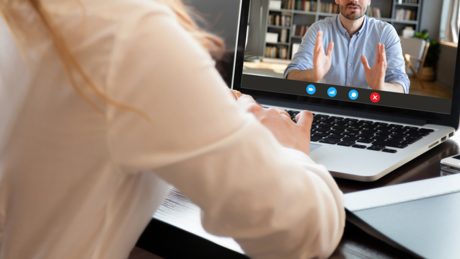When the UK went into lockdown in March, the English judiciary and civil courts showed an immediate willingness to adapt quickly to the situation by embracing virtual trials and hearings. This has cemented the English court’s reputation as one of the leading international dispute resolution jurisdictions. In this article, Associate in our Commercial Litigation team Aleks Valkov, examine how these virtual hearings and trials have worked in practice and what we can expect going forward.
Boris Johnson famously said people “must” stay at home and certain business “must” close when he addressed the country on 23 March 2020. This heralded the lockdown in the UK. The lockdown forced the legal profession and the courts to face a raft of challenges that no one had contemplated meaningfully before.
The first virtual commercial trial
Just before lockdown, Stewarts was preparing to commence trial in the Commercial Court in the case of National Bank of Kazakhstan & anor v The Bank of New York Mellon & ors [2020] EWHC 916 (Comm). We acted for the claimants, the National Bank of Kazakhstan and the Republic of Kazakhstan, in proceedings in the Financial List of the Business and Property Courts. The dispute concerned the freezing of circa US$530m by the Bank of New York Mellon in response to an order of the Belgian court. The trial was listed for seven days starting on 23 March 2020.
Mr Justice Teare, conscious of the possibility of a lockdown, directed the parties to attend a hearing before him on 19 March 2020. Despite the submissions of some of the defendants that the trial should be adjourned, the court ordered the parties to prepare to move to a fully virtual trial and only allowed a short adjournment to facilitate the transition.
We believe this was a landmark decision, indicating the dedication of the courts of England and Wales to continue operating despite the novel and unprecedented challenges. Considering the number of virtual hearings that have taken place every day in 2020, there can be no doubt that both the courts and the legal profession have risen to the challenge. The courts and litigators now work on the assumption that hearings will be virtual unless there is a need to attend court. This is something that would have seemed impossible prior to March 2020.
The logistics of virtual hearings
There are a number of considerations for those involved in virtual hearings, especially longer ones such as trials. Best practice has evolved over the course of 2020 as the courts and users have become more familiar with the technology and have been able to test what works and what does not. In terms of implementation, the Kazakhstan trial had the following features:
- The trial took place over Zoom. Due to historical security issues with Zoom, currently, the court seems to prefer using (i) Microsoft Teams; or (ii) Skype for Business, another Microsoft product. (However, note that as Microsoft is shifting their focus to Teams, and there is no real support for Skype, we understand some users experience technical issues on Skype); or (iii) Cloud Video Platform.
- We relied on Sparq (www.sparq. live) to provide the necessary technical experience to assist, especially with setting up the live- stream of the trial on YouTube. A number of other legal providers (eg Opus 2 and Epiq Global) have begun offering a wide range of services to assist with virtual hearings and trials. However, we note that the court clerks have now had significant experience setting up virtual hearings without the assistance of an external party (though it seems to us prudent to make use of such parties for large trials with many participants).
- The bundle used for the Kazakhstan trial was a simple e-bundle. Again, most providers who work on virtual hearings have begun offering some solution for an electronic bundle, with varying degree of integration into their virtual hearing platform. For example, Opus 2’s Magnum e-bundle offering seems to have been incorporated into their virtual hearings platform. It is worth noting that electronic bundles are not a novelty for the English courts. In fact, the High Court has published a detailed guide on its requirements for e-bundles.
- It is a requirement of English law that the general public should be allowed access to proceedings in open court. To assist with this, the Coronavirus Act 2020 made provisions for the live broadcasting of court proceedings. In the Kazakhstan trial, we relied on Sparq to leverage Zoom and their technical capabilities to broadcast the trial on YouTube. This was a novel approach, but it seems that the court has since moved away from using platforms such as YouTube. Instead, the current approach, which seems to have been adopted across all divisions, allows for interested parties to contact a court clerk and receive an invite for the virtual hearing room.
Notably, many of the witnesses in the Kazakhstan trial were not within the UK and as such either faced travel restrictions or felt uncomfortable travelling. The trial being remote ensured that they could appear before the court. Moreover, it also allowed our clients (who faced similar restriction) to participate meaningfully and to provide us with instructions via telephone or instant messaging. With the UK now in its second lockdown (and with many other countries already in lockdown or likely to follow suit), virtual hearings will continue being the norm for at least the foreseeable future.
Virtual is the new normal
At a recent British Institute of International and Comparative Law (BIICL) webinar, Mrs. Justice Cockerill remarked how well and how quickly the court system has adjusted to virtual hearings. Notably, she also spoke about the court introducing the so-called hybrid hearings where certain parts of the trial (or some of the participants) attended court. These have been used in circumstances where advocates consider it necessary to cross-examine in person (for example, in fraud cases where evidence as to alleged dishonesty may be crucial).
In terms of the future, it seems that although the judiciary has embraced virtual hearings, some have expressed concern whether in a world without Covid-19, virtual hearings will continue to play such an important role (see Mrs Justice Cockerill’s comments in the BIICL’s webinar and Lord Sumption’s remarks at the Leading Litigators Virtual Autumn Reception. However, even if in-person hearings return in a post-Covid world, the courts will no doubt be more willing to use their experiences of virtual technology to overcome logistical challenges that international cases often face. This can only be a good thing for the efficient and effective administration of justice.
This article first appeared in the third edition of ThoughtLeaders4 FIRE. Please click here to view the full magazine. (Subscription required)
Covid-19 is impacting individuals and companies around the world in an unprecedented way. We have collected insights here to help you navigate the key legal issues you may be facing at this time.
You can find further information regarding our expertise, experience and team on our Commercial Litigation pages.
If you require assistance from our team, please contact us or alternatively request a call back from one of our lawyers by submitting this form.
Subscribe – In order to receive our news straight to your inbox, subscribe here. Our newsletters are sent no more than once a month.







